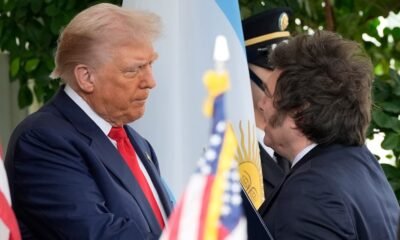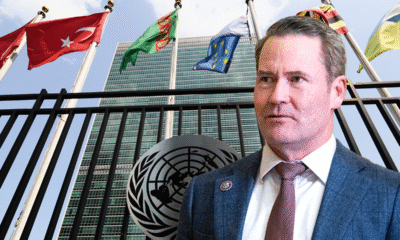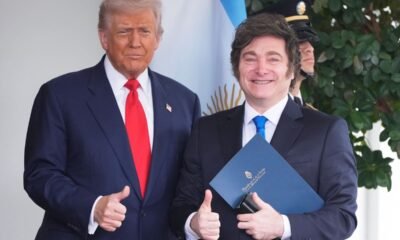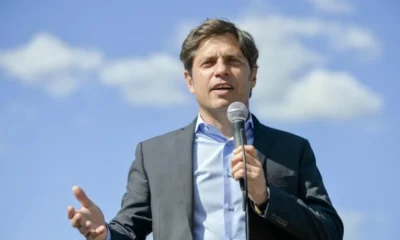INTERNACIONAL
Trump to host Syrian president in historic White House meeting amid push for regional peace

NEWYou can now listen to Fox News articles!
President Donald Trump is preparing to welcome Syrian President Ahmed al-Sharaa on Monday in what officials describe as a historic step toward testing whether Damascus can be drawn back into diplomacy after years of war and isolation.
The high-profile meeting underscores a new chapter in U.S.–Syria relations after more than a decade of hostility. A senior administration official told Fox News Digital the visit will focus on counterterrorism cooperation, economic development, and advancing regional peace and security.
During the visit, the official said, «Syria will announce that it is joining the Global Coalition to Defeat ISIS. Syria will thus become the 90th member of the D-ISIS Coalition, partnering with the United States to eliminate ISIS remnants and halt foreign fighter flows.»
The visit follows a week of major policy shifts. On Thursday, the U.N. Security Council voted 14-0, with China abstaining, to remove sanctions on al-Sharaa and Syria’s interior minister. Additionally, Reuters reported that al-Sharaa and his interior minister, Anas Khattab, had formerly been subject to financial sanctions targeted at al Qaeda and ISIS, with the United States designating them Specially Designated Global Terrorists.
SYRIA’S INTERIM PRESIDENT AL-SHARAA EXPECTED TO MEET WITH TRUMP IN FIRST VISIT BY SYRIAN LEADER TO WHITE HOUSE
In this photo released by the Saudi Royal Palace, interim Syrian President Ahmad al-Sharaa shakes hands with President Donald Trump in Riyadh, Saudi Arabia on May 14. At right is Saudi Crown Prince Mohammed bin Salman. (AP)
The meeting comes about six weeks after al-Sharaa — the former commander of Hay’at Tahrir al-Sham, once affiliated with al Qaeda — addressed the U.N. General Assembly on Sept. 24, the first by a Syrian head of state in six decades. There, he urged the West to lift sanctions and called for international support to rebuild the country.
According to the administration official, that is about to happen: «Treasury, State, and Commerce will jointly announce measures taken to lift economic restrictions and provide compliance clarity for investors. The United States will allow Syria to resume operations at its Embassy in Washington to further counterterrorism, security, and economic coordination.»
Syrian officials are seeking a reassessment of the Caesar Act sanctions, the main U.S. law still restricting commercial ties with Damascus.
The senior administration official told Fox News Digital, «The Administration is issuing a 180-day suspension of the Caesar Act and is urging Congress to permanently repeal the Act to unlock economic growth. The Trump Administration supports the full repeal of the Caesar Act. This is in line with the President’s announcement on cessation of sanctions. Removal is key to allowing U.S. business and regional states to operate in Syria.»

Syrian security forces walk together along a street, after clashes between Syrian government troops and local Druze fighters resumed in the southern Druze city of Sweida early on Wednesday, collapsing a ceasefire announced just hours earlier that aimed to put an end to days of deadly sectarian bloodshed, in Sweida, Syria July 16, 2025. (Karam al-Masri/Reuters)
EVANGELICAL LEADER SAYS US MUST PROTECT SYRIAN CHRISTIANS FROM ATTACKS BY JIHADI TERRORISTS
Rep. Abe Hamadeh, R-Ariz., who visited Damascus this summer, told Fox News Digital he views the visit as an opportunity to end years of bloodshed.
«This is the first chance Syria has to emerge from decades of brutal oppression and more than a decade of civil war,» the congressman said. «I went to Damascus to make sure missing Americans like Kayla Mueller are not forgotten, to advocate for expanding the Abraham Accords, and to remind Syria’s new leaders that they must include minorities like the Druze, Christians, and Kurds and protect their rights.»
On Friday, about 100 influential Christian leaders sent a letter to President Trump calling on him to raise the issue of minority rights and protection with the Syrian leader. The letter was led by Dede Laugesen, president of Save the Persecuted Christians, and included Ralph Reed, Tony Perkins, Samuel Rodriguez, Rob McCoy and Alveda King.
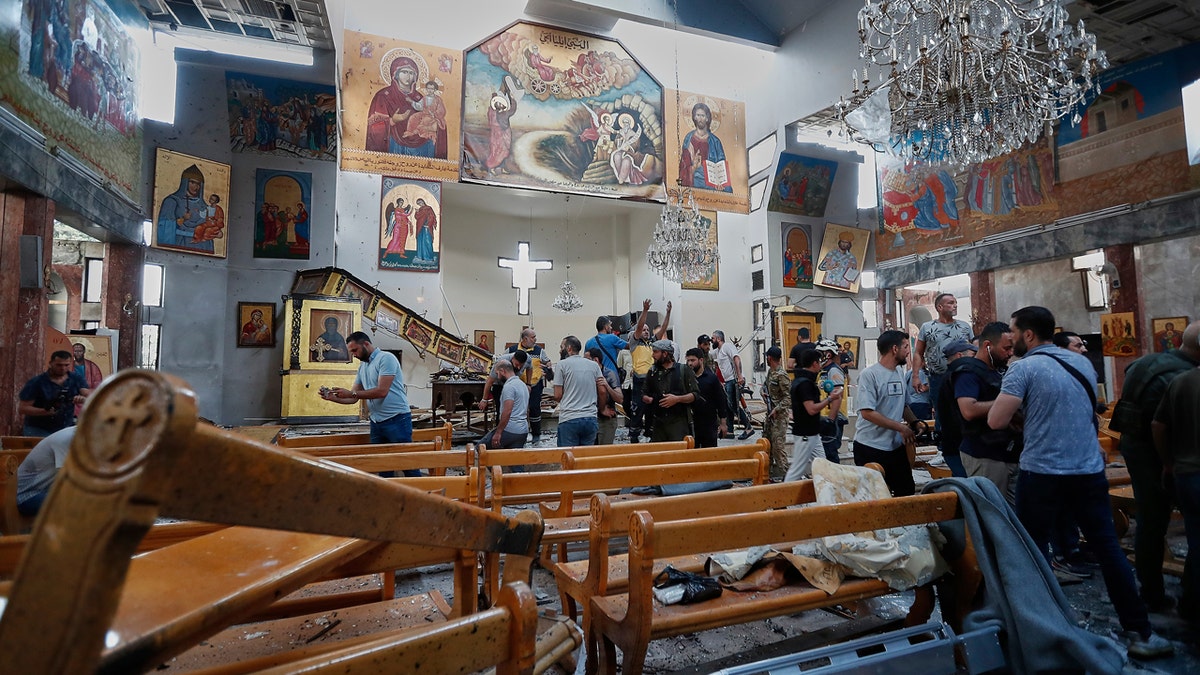
Syrian citizens and security forces inspect the damage inside Mar Elias church where a suicide bomber detonated himself in Dweil’a on the outskirts of Damascus, Syria, Sunday, June 22, 2025. (Omar Sanadiki/AP Photo)
In it, they thanked Trump for his efforts in protecting Christians and also asked him to bring up the issue with al-Sharaa. «We urge you to address directly the massacre of Christians, Kurds, Druze, and Alawites in Syria, notably in the greater Suwayda area. These religious minorities face ongoing violence, death, displacement, starvation, and water and medical deprivation—all while innocent women and children are held hostage by ISIS terrorists.»
«Mr. President, we respectfully request that you secure President al-Sharaa’s commitment to opening a secure humanitarian corridor from Hader to Suwayda in southern Syria. This corridor will enable safe and secure aid delivery and civilian evacuation, signaling the new government’s commitment to minority rights and stability,» the letter stated.
SYRIA’S NEW PRESIDENT TAKES CENTER STAGE AT UNGA AS CONCERNS LINGER OVER TERRORIST PAST
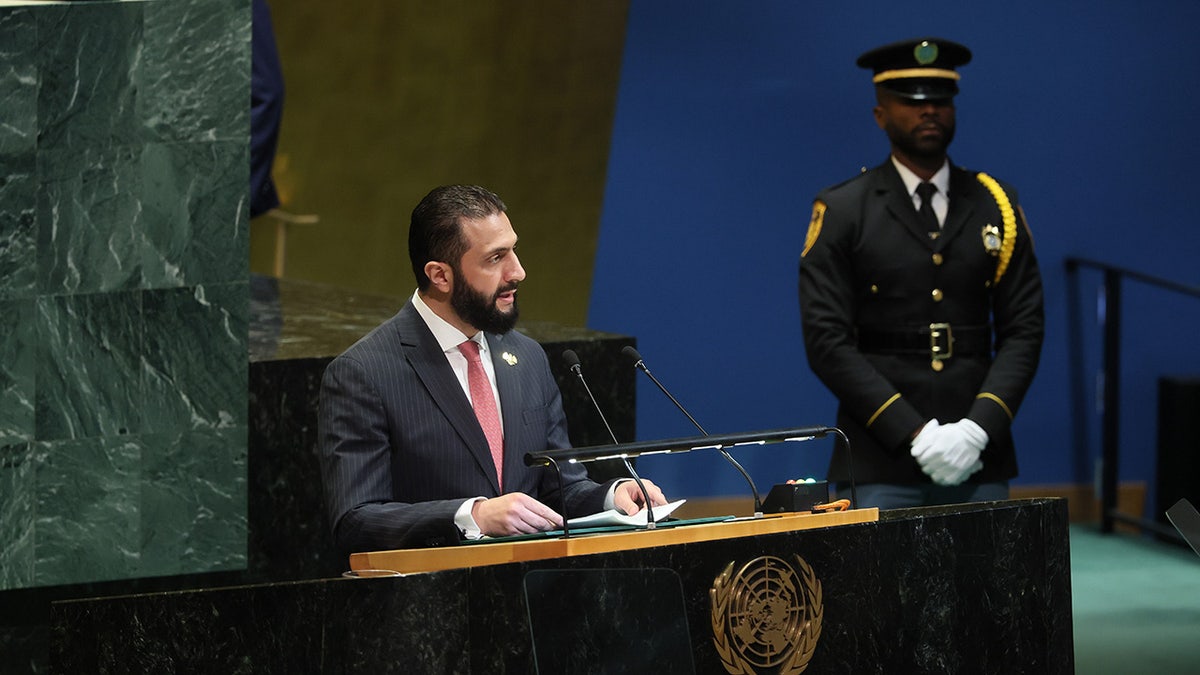
President of Syria Ahmad Al-Sharaa speaks during the United Nations General Assembly (UNGA) at the United Nations headquarters on Sept. 24, 2025, in New York City. (Michael M. Santiago/Getty Images)
Ahmad Sharawi of the Foundation for Defense of Democracies told Fox News Digital that Washington hopes to use the meeting to pursue stability and contain Iran’s influence.
«The U.S. interest is having a government that is willing to fight ISIS and stop Iran from re-emerging,» he said. «I think the U.S. will try to find a solution to the Kurdish issue in northeast Syria and build a unified country with no decentralization or federalism.»
He cautioned that al-Sharaa’s domestic record shows «a political system that is not inclusive» and a pattern of power centralization. Despite those concerns, he added, many Syrians see him as «the only figure capable of holding the country together.»

People welcome the leader of Syria’s Islamist Hayat Tahrir al-Sham (HTS) group that headed a lightning rebel offensive snatching Damascus from government control, Ahmed al-Sharaa (C), before his address at the capital’s landmark Umayyad Mosque on Dec. 8, 2024. Al-Sharaa gave a speech as the crowd chanted «Allahu akbar (God is greatest),» in a video shared by the rebels on their Telegram channel showed. (Aref Tammawi /AFP via Getty Images)
In October, al-Sharaa traveled to Russia to meet with President Vladimir Putin — a move Sharawi said highlights both pragmatism and risk.
«One would think that 11 months ago, when the Russians were air-striking Idlib and al-Sharaa’s forces, we wouldn’t see al-Sharaa meeting with Putin in Moscow,» Sharawi said. «But it’s a clear indicator of how al-Sharaa operates — focused on securing his interests but also being pragmatic.»
He added that the outreach signals to the West that «if you don’t give me what I want, I have other countries I can lean on,» and said it’s an effort to secure weapons and political backing after years of war and loss of equipment.
SYRIAN PRESIDENT’S HISTORIC UN SPEECH JOINED BY THOUSANDS RALLYING OUTSIDE FOR PEACE AND TRUMP’S SUPPORT

Ahmed al-Sharaa, once known by his nom de guerre Abu Mohammed al-Jolani, is seen in Syria Feb. 7, 2023. Since becoming the country’s president, he has gone back to his given name. (OMAR HAJ KADOUR/AFP via Getty Images)
«That’s why I asked CENTCOM’s Gen. Michael Kurilla during House Armed Services Committee hearings about these opportunities and risks — and wrote the NDAA section on assessing the feasibility of defense partnerships with the new Syrian government,» Hamadeh said. «We must ensure that ISIS and Iran never return and make sure the Russians and Chinese are kept at a distance.»
Syrian-American activist Hicham Alnchawati of the Syria Freedom Path organization told Fox News Digital that Syrians largely welcome the visit.
«They’re looking for a better future,» he said. «They suffered the war — there’s no water, no food, no economy, and no security. He knows his interest is with the U.S. He’s coming here to achieve mutual interests for both the U.S. and Syria.»
Alnchawati argued that lasting stability will require eliminating Iran’s and Hezbollah’s influence.
«If you really want stability in the Middle East, you have to finish the job with Hezbollah and the Iranians,» he said. «They have to be totally dismantled. Otherwise, they’ll reignite the conflict one more time.»
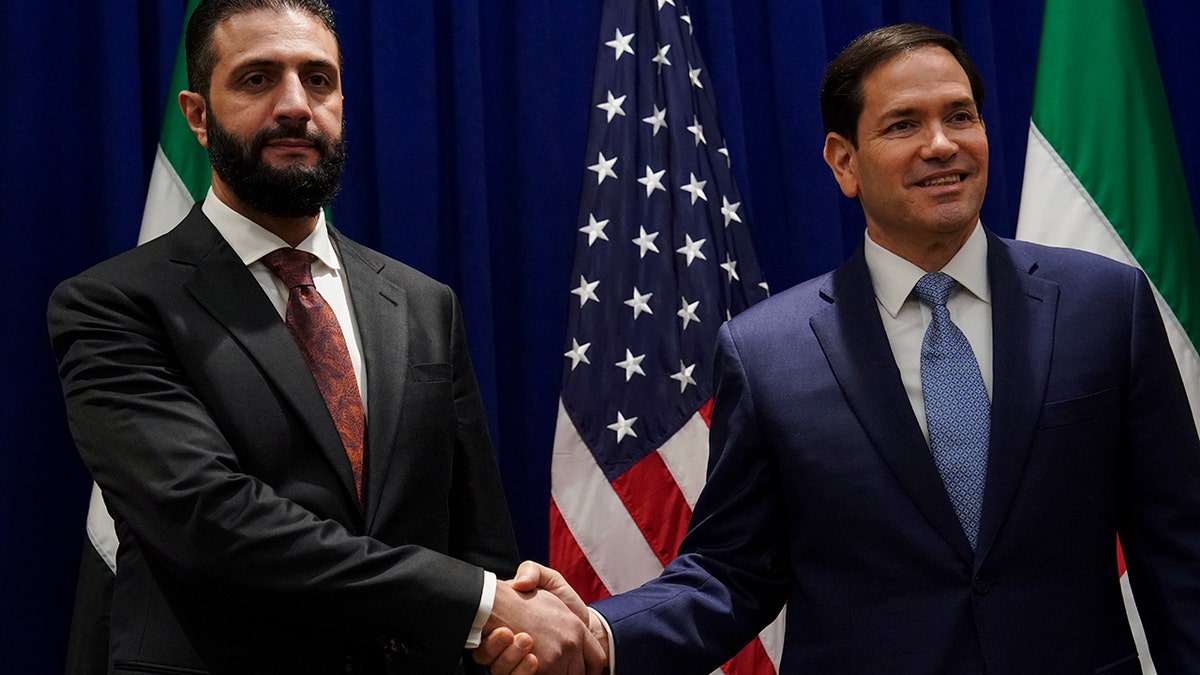
Secretary of State Marco Rubio shakes hands with Syrian interim President Ahmad al-Sharaa at the Lotte New York Palace Hotel, on the sidelines of the 80th United Nations General Assembly at the United Nations headquarters, Monday, Sept. 22, 2025. (Bing Guan/Pool Photo via AP)
CLICK HERE TO DOWNLOAD THE FOX NEWS APP
The United Nations and U.S. sanctions decisions have sparked debate in Washington and Europe. Reuters and the Associated Press reported that some lawmakers and rights groups argue that legitimizing a former jihadist commander could undercut accountability for past abuses, while supporters say the relief offers Damascus an incentive to cooperate on counterterrorism and drug control.
Sharawi told Fox News Digital the policy to bid on al-Sharaa «gives Damascus a powerful incentive but leaves Washington exposed. The political cost of failure would be enormous.»
syria,donald trump,middle east,iran,russia,united nations
INTERNACIONAL
Un Chile en pánico por la inseguridad y la violencia elige presidente y escalan los discursos de mano dura
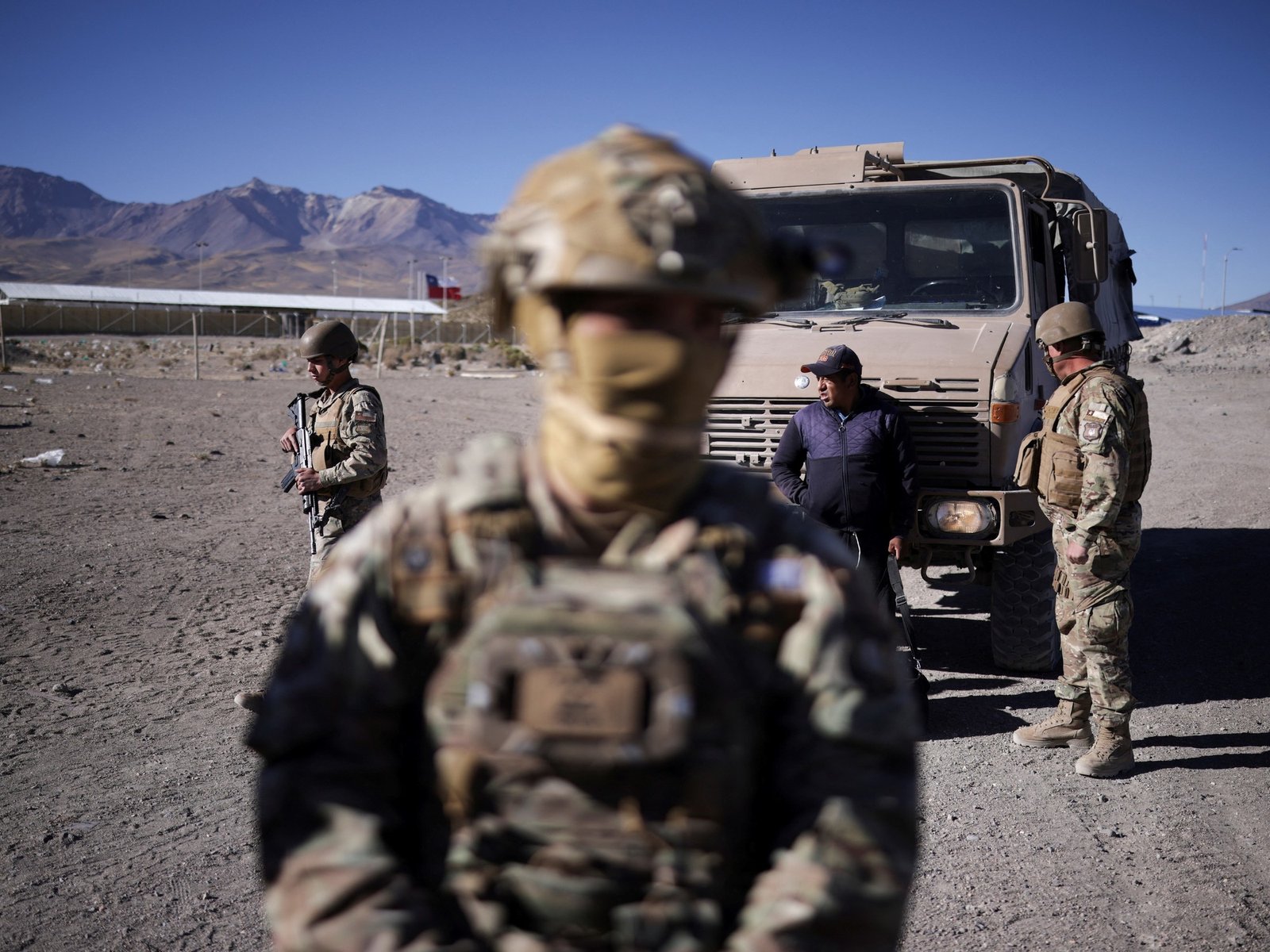
Las cifras y el miedo
INTERNACIONAL
DNC staffers ruthlessly mocked for fuming over remote work reversal: ‘Get yourselves together’
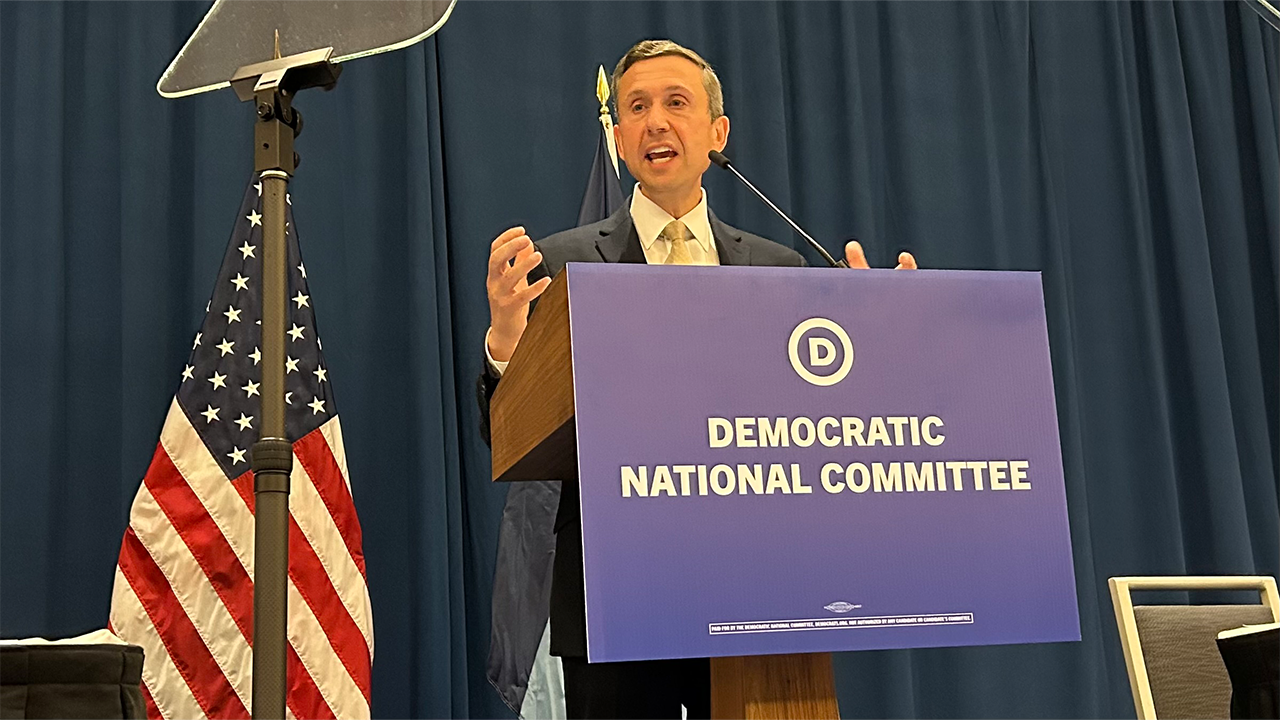
NEWYou can now listen to Fox News articles!
Democratic National Committee employees were mercilessly mocked this week after news came out that staffers were very unhappy with a recent directive from DNC Chairman Ken Martin end to remote work for employees who will now be required to show up to the office five days a week.
Leadership of the union representing DNC employees put out a statement following news of the new directive, describing it as «callous.» Reports from those on the staff-wide call also described an immediate flurry of thumbs-down emojis and other signs of anger upon news of the new requirement.
«It was shocking to see the DNC chair disregard staff’s valid concerns on today’s team call,» they wrote. «D.N.C. staff worked extremely hard to support historic wins for Democrats up and down the ballot last Tuesday, and this change feels especially callous considering the current economic conditions created by the Trump administration.» Martin reportedly told employees that if they don’t like the new policy, they should go find a job elsewhere.
And Martin wasn’t the only Democrat who had some harsh and pointed words for the Democratic Party staffers. Neera Tanden, former President Joe Biden’s domestic policy advisor, had a similar message for DNC staffers, suggesting there were many eager folks waiting in line who would likely be more than willing to go into the office.
PROGRESSIVE DEMOCRATS TURN ON PARTY LEADERSHIP AFTER GOVERNMENT SHUTDOWN ENDS WITHOUT HEALTHCARE GUARANTEES
Democratic National Committee Chairman Ken Martin speaking from the DNC’s home studio. (Bill Clark/CQ-Roll Call, Inc via Getty Images)
«If you think democracy is on the line – working in the office is not a big ask,» Tanden wrote in a post on X. «And there are plenty of other people willing to step up. Get yourselves together people.»
A left-wing group, the Center for New Liberalism, echoed the view that the staffers «should look elsewhere» if working from home is a «must-have.»
«When you accept a job on a campaign, or with an org like the DNC, DCCC, etc, your single purpose is to win the election. It is a demanding job that requires long hours & sacrifices,» the group wrote on X. «The other part of this is that I suspect [work from home] staff are probably losing opportunities for themselves by not being in the office. Campaigns require a lot of personal sacrifice, but the people who are good at their job and work to make themselves noticed in the office usually tend to go on to do big things!»
One Florida-based Democratic strategist, Steve Schale, who led Barack Obama’s statewide efforts in Florida in 2008 and returned to help his campaign in 2012, said the DNC should implement a «requirement» to ensure those who want to work at the DNC really have what it takes.
«There should be a requirement that to work at the DNC that you’ve done at least two cycles on an actual battleground campaign, where terms like flex hours & hybrid work don’t exist,» Schale wrote on X.
6 HOUSE DEMOCRATS EXPLAIN BREAKING WITH PARTY TO END SHUTDOWN

A man is seen walking in front of the Democratic National Committee’s headquarters located in Washington, D.C. (Photo by Kevin Dietsch/Getty Images)
Meanwhile, Republicans did not spare the opportunity to slam Democratic Party staffers as well.
«You can’t make this up — the DNC union is pissed that the Chairman is calling staff back into the office 5 days a week,» former Trump White House press secretary, Sean Spicer, said after learning of the anger. GOP strategist, Matt Gorman, quipped that the image of DNC staffers logging onto a Zoom call in their pajamas amid all the chaos of Biden’s reelection «is hilarious.»
«The best part is that they still get two full months before they actually have to get out of bed 5 days week,» GOP National Press Secretary Kiersten Pels said. «Is this a political committee or a daycare?»
Martin reportedly told his employees that the work-from-home policy the DNC implemented during COVID was never meant to be permanent, describing it as a «Band-Aid» that has long needed to be ripped off. He did say that remote work would still be allowed on a case-by-case basis, however.
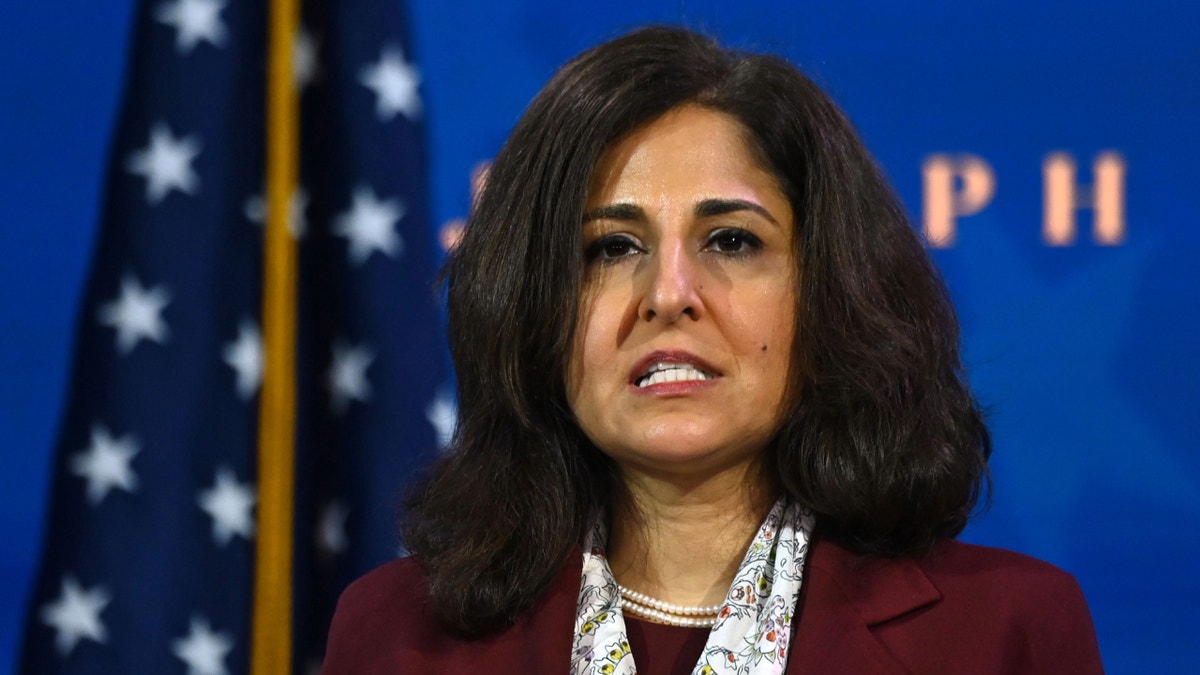
Neera Tanden, one of former President Joe Biden’s top advisors in the White House, was among those Democrats who slammed DNC staffers for being upset of having to go back into the office full-time, as opposed to remote work. (Chandan Khanna/AFP via Getty Images)
CLICK HERE TO DOWNLOAD THE FOX NEWS APP
The staffer’s union said it is considering all options in terms of challenging the measure. The group previously ratified a collective bargaining agreement with the DNC over the summer that «reaffirms its commitment to making hybrid work available,» but also includes language that allows for a full return to in-person working as long as there is a 60-day notice period, according to the New York Times.
Earlier this year, the Congressional Progressive Staff Association sent a letter to top House and Senate leaders proposing a rotating 32-hour work week for congressional staffers, arguing it would be a more «sustainable approach to work on a national level.»
The proposal was widely mocked, however.
«Why not be bold and ask for a 0-hour workweek?» quipped Rep. Ritchie Torres, D-N.Y., at the time. «I wonder how blue-collar Americans would feel about white-collar workers demanding a 32-hour workweek.»
democratic party,politics,democrats elections,health work,tech,topics
INTERNACIONAL
Persecución en Cuba: la dictadura acusó a un medio digital independiente de “tráfico de divisas” y “evasión fiscal”

El primer ministro de la dictadura de Cuba, Manuel Marrero, acusó este jueves al medio digital no oficial El Toque de tráfico de divisas y evasión fiscal, en el contexto de un creciente enfrentamiento con la prensa independiente. La denuncia se realizó en redes sociales y siguió a la emisión, el miércoles por la noche, de un documental en la televisión estatal que acusa al medio —con sede en Miami— de recibir fondos de Estados Unidos y de buscar la desestabilización del país.
En medio de la campaña oficial contra El Toque, Marrero aseguró: “Se trata de un programa integral de guerra económica organizado, financiado y ejecutado directamente por el gobierno de EEUU”.
Las autoridades cubanas han intensificado las críticas contra El Toque, conocido por publicar diariamente la tasa de cambio del mercado informal, muy distinta a la establecida oficialmente por el régimen cubano y utilizada como referencia mayoritaria para operaciones monetarias en la isla. Según Marrero, la tasa de cambio informada por El Toque es “una farsa” y el resultado de “una burda manipulación”, declaraciones recogidas durante esta ofensiva mediática.
Mientras tanto, los medios del régimen enlazaron la acusación de Marrero con críticas al funcionamiento del propio sitio, al que señalaron de “mercenarismo”, “enriquecimiento ilícito”, “manipulación cambiaria” y de operar “en contra del bienestar del pueblo”. La controversia surge en un contexto en el que la tasa oficial, instaurada en 2022, es de 1 dólar estadounidense (USD) por 24 pesos cubanos (CUP) para entidades jurídicas y de 1 USD por 120 CUP para personas físicas, mientras que El Toque posicionó este jueves el cambio en 1 USD por 460 CUP.
La información publicada por El Toque se ha vuelto central en la vida cotidiana de los cubanos, ya que la mayoría de las transacciones informales en la isla toman como base la cotización de este medio.
La coexistencia de tres tasas de cambio provoca severas distorsiones en la economía local, dificultando la lucha contra la inflación, el descenso del poder adquisitivo, el proceso de dolarización, las carencias de productos básicos, el déficit y la descapitalización de los bancos estatales. Según expertos citados por EFE, esta situación sin precedentes convive con una crisis sistémica que afecta al país desde hace más de un lustro, sin señales claras de recuperación a corto o mediano plazo.
El régimen cubano ha anunciado en varias ocasiones, la última vez hacia finales de 2023, la intención de introducir reformas para corregir las distorsiones cambiarias. Entre ellas, la introducción de una tasa de cambio “flotante” para la segunda mitad de 2024. Sin embargo, hasta la fecha, ni el modelo ni la implementación han sido esclarecidos públicamente. Ante la escasez crónica de divisas, el Estado aceleró la dolarización parcial de la economía abriendo decenas de tiendas que sólo aceptan moneda extranjera y habilitando el cobro en divisas de diversos servicios estatales, prácticas justificadas por la necesidad de recapitalizar el país que importa el 80% de lo que consume.
Frente a los señalamientos, El Toque ha negado en múltiples ocasiones toda acusación oficial, argumentando que su tasa de referencia surge de un algoritmo que recopila anuncios de compraventa de divisas en foros y redes sociales, filtrando valores anómalos bajo supervisión del economista Pavel Vidal. Varios especialistas cubanos, consultados por EFE, admitieron la confiabilidad relativa del método, aunque reconocen que se basa en ofertas y no en transacciones reales, y utiliza la mediana como parámetro, no la moda.
La presión sobre El Toque ha resultado en campañas oficiales contra su personal e incluso provocó la emigración de una gran parte de sus periodistas, luego de ser interrogados por la Seguridad del Estado.
Este clima se ha visto reforzado por la reciente acusación de “espionaje” y “corrupción” contra Alejandro Gil, ex ministro de Economía cercano al presidente Miguel Díaz-Canel, reviviendo el debate sobre las purgas políticas al más alto nivel. Gil, de 61 años, permanece fuera de la vida pública. La reacción oficialista ha sido comparada con anteriores expulsiones repentinas de figuras clave dentro del Estado cubano, como las de Felipe Pérez Roque y Carlos Lage en 2009, o el fusilamiento del general Arnaldo Ochoa en 1989 tras un proceso judicial por narcotráfico, hechos que han marcado la historia política reciente del país.
(Con información de AFP y EFE)
South America / Central America

 CHIMENTOS3 días ago
CHIMENTOS3 días agoWada Nara se despidió de sus hijas con un desgarrador mensaje al entregárselas a Mauro Icardi: «Que la pasen hermoso»

 POLITICA3 días ago
POLITICA3 días agoAxel Kicillof prometió no subir impuestos, pero montó un mecanismo de recaudación con Ingresos Brutos

 ECONOMIA2 días ago
ECONOMIA2 días agoGuiño al crédito fintech: el BCRA autorizará el débito directo de cuotas, prohibido durante el Gobierno anterior

